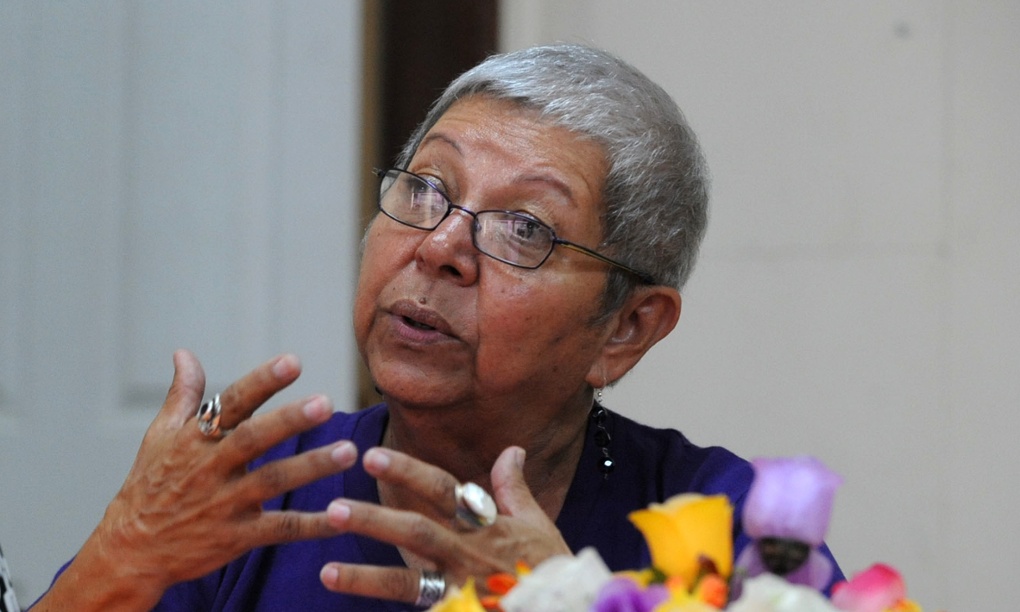Gladys Lanza, a long-time veteran Honduran feminist activist, was recently convicted of defamation for defending a woman who accused a Honduran government official of sexual harassment. The verdict is aimed at sending a powerful message to all defenders of women’s rights in the country: “If you don’t want to be prosecuted, stay silent.”
In Honduras, violent deaths among women increased by 263.4% from 2005 to 2013. In 2009, the year of the coup d’état, femicide rose by 62%, while in 2013, a woman was murdered somewhere in the country every 15 hours. Between 2012 and 2013, 525 cases of harassment against women’s rights activists were documented. From 2009 to 2012, victims filed 82,547 accusations of domestic violence, 92% of which came from women. In 2013 alone, 2,851 charges of sexual violence were filed. More than 90% of cases end up with no conviction. The work of women’s rights activists is more important than ever.
Lanza has been fighting injustice in Honduras for more than 30 years and is one of the most widely known and respected feminists. She is the legal representative of the Visitación Padilla movement, one of the most highly regarded women’s organisations in Honduras, members of which are commonly known as the “Chonas” (women of feminist ideals).
Lanza has served time in prison on bogus charges, her name has appeared on lists of political dissidents sought by a paramilitary squadron, and in 1991, a bomb destroyed her house. In 2010, the Inter-American Court of Human Rights ordered the government to guarantee the protection of Lanza, which she says has not happened.
In 2009, the Chonas took on the case of Lesbia Pacheco, human resources director of the Foundation for Development of Social, Urban and Rural Housing, who said she had been dismissed from her post and had faced harassment at work for rejecting the sexual advances of her supervisor, Juan Carlos Reyes, a public official.
Reyes was charged with sexual harassment and workplace harassment. He was cleared of workplace harassment and the investigation into the sexual charges was stopped and filed, and effectively lost in the system.
In 2011, the Chonas organised a sit-in demonstration during which they publicly denounced Reyes. Lanza, who took part in the protest, was charged with defamation and found guilty. Her sentence will be announced this month.
Reyes now alleges that he is being discriminated against for being a man, an accusation that could add two more years to Lanza’s sentence.
Yet it is evident that the entire case is about silencing the Honduran feminist movement, currently facing intense repression and harassment.
The Honduran government is using its institutions to silence people who speak out and to perpetuate violence against women. The judicial system is one of the greatest obstacles to applying international instruments that would protect women, such as the Belém do Pará Convention (Inter-American Convention on the Prevention, Punishment, and Eradication of Violence against Women) and the convention on the elimination of all forms of discrimination against women, which Honduras has not ratified.
This year, Honduras will appear before the Universal Periodic Review of Human Rights, an obligation for all UN member countries. The Honduran government is determined to show some progress, since a favourable judgment will bring international aid aimed at alleviating the country’s precarious economic situation.
We will face obstacles, because breaking chains is not easy, but we shall push forward
Yet the guilty verdict handed down to one of Honduras’s most respected human rights defenders sends a clear message about the repression and censorship faced by the entire human rights movement and the lack of freedom of speech. The government cannot hope to show progress in matters of human rights when it uses the power of its institutions to persecute defenders of women’s rights, who are undertaking the work that authorities refuse to do.
“We women are leading the way on the road we must follow. We must refuse to give in or feel disappointment, this is our work and we must be convinced that we are doing the right thing; we will face obstacles because breaking chains is not easy, but we shall push forward,” Lanza said recently, expressing confidence in the strength of the Honduran feminist movement. She is convinced that the case against her is a testimony to the important political change that women have brought about in Honduras.
Regardless of her sentence, Lanza knows feminists will carry her voice to all corners. Even though laws may convict women, legitimacy envelops their work, their courage, their resistance. For this reason, Lanza’s case is not a warning but a story of resilience and endurance. As she has said repeatedly: “Only the strength of united women can overcome the system.”
This article was written by JASS Mesoamerica‘s Catalina Ruiz-Navarro for the Guardian and published on March 18, 2015.


























